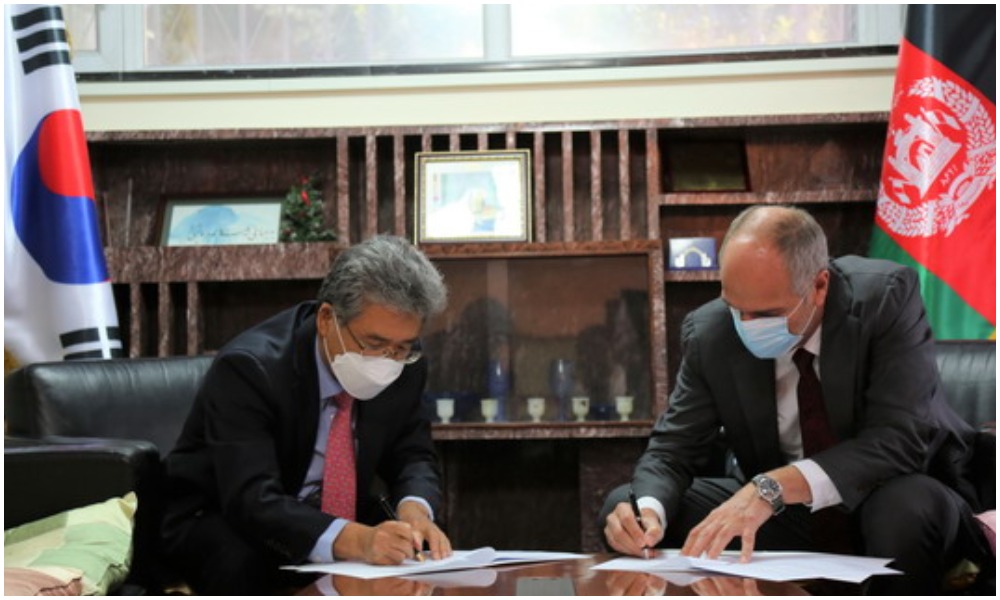COVID-19
Korea pledges $1m to help Afghanistan tackle pandemic

The South Korean embassy in Kabul signed a US$1 million grant with the World Health Organization (WHO) this week to assist in efforts to fight the COVID-19 pandemic in Afghanistan.
According to WHO, the organization will receive funding to implement the “Strengthening access to quality health care in the most vulnerable population in Afghanistan” project, over a six-month period.
In a joint statement issued by the organizations, WHO said the project is expected to bolster efforts to increase COVID-19 testing across the country through the provision of specimen collection kits for 15 rapid response teams (RRTs), which will enable sample collection from 40,500 people; provision of diagnostic kits to the Ministry of Public Health to cover testing for 50,000 people, and provision of testing consumables for RRTs and laboratory technicians across the country to cover testing needs for at least 10,520 people.
“The project will also play a critical role in improving awareness about COVID-19 through community-based engagement, targeting 314,900 people across priority regions of the country and building field teams’ capacity to better engage and communicate with communities.” the statement read.
The grant arrangement was signed by the Korean ambassador Zha Hyoung Rhee, and Dr Richard Peeperkorn, WHO Representative for Afghanistan.
Both parties to the agreement emphasized the importance of continued support from the international community to help Afghanistan in its fight against COVID-19.
“While the pandemic does not respect borders when it comes to its negative impacts, there is no denying that those countries which lack in medical infrastructure are more vulnerable,” said Rhee.
“Considering Korea’s experiences, 3Ts, i.e., testing, tracking, and treatment constitute the major components of an effective response to the pandemic. I sincerely hope that the support from Korea, especially regarding the earliest stage of those response activities, will help mitigate, to a considerable extent, the impact of the pandemic which has been inflicting enormous damage not only on the already dire humanitarian situation but also on the essential socio-economic fabric of Afghanistan,” Rhee added.
More than six months since the onset of the COVID-19 emergency in Afghanistan, cases continue to rise but severe testing restrictions have plagued the country, which already has a fragile health care system.
As of Monday, 38,772 confirmed cases and 1,425 deaths had been reported.
Peeperkorn in turn said: “The crisis is far from over.”
He noted the country had gone through a substantial first wave but that everyone needs to be prepared for secondary spikes.
While Afghanistan’s official COVID-19 toll stands at close to 40,000, the Afghan Health Ministry and WHO stated early last month that they estimate nearly a third of the population – about 10 million people – had already been infected.
Health Minister Ahmad Jawad Osmani told reporters on August 5 that a survey had been carried out and had been based on antibody tests.
The survey estimated that about 31.5 percent of the population of 32 million had contracted the virus, with the highest infection rate in the capital, Kabul where more than half of the city’s five million people are believed to have been infected.
Afghanistan, which has poor health infrastructure and has been wracked by decades of war, has only limited testing capacity.
But the new “Strengthening access to quality health care in the most vulnerable population in Afghanistan” project is a part of the COVID-19 ONE UN Health Response Plan and is aligned with the overall support that WHO is providing to Afghanistan to address needs related to COVID-19.
COVID-19
WHO declares end to COVID global health emergency

The World Health Organization said Friday that COVID-19 no longer qualifies as a global emergency, marking a symbolic end to the devastating coronavirus pandemic that triggered once-unthinkable lockdowns, upended economies and killed millions of people worldwide.
The announcement, made more than three years after WHO declared the coronavirus an international crisis, offers some relief, if not an ending, to a pandemic that stirred fear and suspicion, hand-wringing and finger-pointing across the globe, AP reported.
The U.N. health agency’s officials said that even though the emergency phase was over, the pandemic hasn’t finished, noting recent spikes in cases in Southeast Asia and the Middle East.
WHO says thousands of people are still dying from the virus every week, and millions of others are suffering from debilitating, long-term effects.
“It’s with great hope that I declare COVID-19 over as a global health emergency,” WHO Director-General Tedros Adhanom Ghebreyesus said.
“That does not mean COVID-19 is over as a global health threat,” he said, warning that new variants could yet emerge. Tedros noted that while the official COVID-19 death toll was 7 million, the real figure was estimated to be at least 20 million.
Tedros said the pandemic had been on a downward trend for more than a year, acknowledging that most countries have already returned to life before COVID-19.
He bemoaned the damage that COVID-19 had done to the global community, saying the pandemic had shattered businesses, exacerbated political divisions, led to the spread of misinformation and plunged millions into poverty.
When the U.N. health agency first declared the coronavirus to be an international crisis on Jan. 30, 2020, it hadn’t yet been named COVID-19 and there were no major outbreaks beyond China.
More than three years later, the virus has caused an estimated 764 million cases globally and about 5 billion people have received at least one dose of vaccine.
In the U.S., the public health emergency declaration made regarding COVID-19 is set to expire on May 11, when wide-ranging measures to support the pandemic response, including vaccine mandates, will end. Many other countries, including Germany, France and Britain, dropped most of their provisions against the pandemic last year.
When Tedros declared COVID-19 to be an emergency in 2020, he said his greatest fear was the virus’ potential to spread in countries with weak health systems.
Most recently, WHO has struggled to investigate the origins of the coronavirus, a challenging scientific endeavor that has also become politically fraught.
COVID-19
COVID-19 in Iran: Nearly 900 new cases, 24 deaths recorded

The Iranian health ministry announced on Sunday that more than 890 new cases of COVID-19 have been identified across the country during the past 24 hours, adding that 24 patients have died in the same period of time, Fars News Agency reported.
“A sum of 891 new patients infected with COVID-19 have been identified in the country based on confirmed diagnosis criteria during the past 24 hours,” the Iranian Health Ministry’s Public Relations Center said on Sunday, adding, “454 patients have been hospitalized during the same time span.”
The ministry’s public relations center said 611 people infected with COVID-19 are in critical condition.
COVID-19
China says 200 million treated, pandemic ‘decisively’ beaten

China says more than 200 million of its citizens have been diagnosed and treated for COVID-19 since it lifted strict containment measures beginning in November.
With 800,000 of the most critically ill patients having recovered, China has “decisively beaten” the pandemic, according to notes from a meeting of the ruling Communist Party’s all-powerful Politburo Standing Committee presided over by President and party leader Xi Jinping, AP reported.
China enforced some of the world’s most draconian lockdowns, quarantines and travel restrictions and still faces questions about the origins of the virus that was first detected in the central Chinese city of Wuhan in late 2019. Heavy-handed enforcement prompted rare anti-government protests and took a heavy toll on the world’s second-largest economy.
The official Xinhua News Agency quoted Xi as saying that policies to control the outbreak had been “entirely correct.” The abrupt lifting in November and December of the “zero COVID” policy that had sought to eliminate all cases of the virus led to a surge in infections that temporarily overwhelmed hospitals.
Case numbers have since peaked and life has largely returned to normal, although international travel in and out of China has yet to return to pre-pandemic levels.
China is now transitioning to a post-pandemic stage after a fight against the outbreak that was “extraordinary in the extreme,” Xinhua said.
The government will continue to “optimize and adjust prevention and control policies and measures according to the times and situations with a strong historical responsibility and strong strategic determination,” Xinhua said.
-

 Sport5 days ago
Sport5 days agoRashid Khan threatens BBL pullout after Australia postpones Afghanistan T20I series
-

 Sport4 days ago
Sport4 days agoAfghanistan Champions League kicks off with grand opening ceremony
-

 Latest News3 days ago
Latest News3 days agoPakistan’s frontiers minister stresses ‘dignified’ return of Afghan refugees
-

 Regional4 days ago
Regional4 days agoIran’s foreign minister downplays drone attack, says Tehran investigating
-

 Latest News5 days ago
Latest News5 days agoTen people killed by floods in Helmand
-

 Business4 days ago
Business4 days agoAfghanistan’s economic prospects are bleak: World Bank
-

 Latest News4 days ago
Latest News4 days agoMore than 800 Afghan refugees deported from Pakistan in two days
-

 Regional2 days ago
Regional2 days agoIranian president lands in Pakistan for three-day visit to mend ties
























